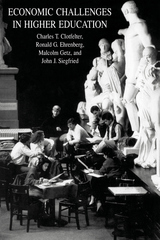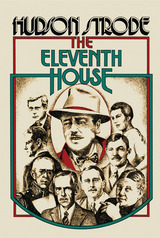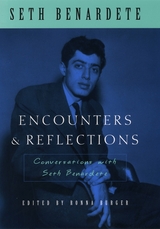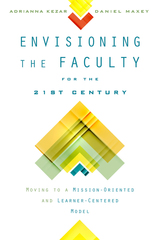112 books about College teachers and 4
start with E
112 books about College teachers and 4
112 books about College teachers
4 start with E start with E
4 start with E start with E

Economic Challenges in Higher Education
Charles T. Clotfelter, Ronald G. Ehrenberg, Malcolm Getz, and John J. Siegfried
University of Chicago Press, 1991
The last two decades have been a turbulent period for American higher education, with profound demographic shifts, gyrating salaries, and marked changes in the economy. While enrollments rose about 50% in that period, sharp increases in tuition and fees at colleges and universities provoke accusations of inefficiency, even outright institutional greed and irresponsibility. As the 1990s progress, surpluses in the academic labor supply may give way to shortages in many fields, but will there be enough new Ph.D.'s to go around?
Drawing on the authors' experience as economists and educators, this book offers an accessible analysis of three crucial economic issues: the growth and composition of undergraduate enrollments, the supply of faculty in the academic labor market, and the cost of operating colleges and universities. The study provides valuable insights for administrators and scholars of education.
Drawing on the authors' experience as economists and educators, this book offers an accessible analysis of three crucial economic issues: the growth and composition of undergraduate enrollments, the supply of faculty in the academic labor market, and the cost of operating colleges and universities. The study provides valuable insights for administrators and scholars of education.
[more]

The Eleventh House
Memoirs
Hudson Strode, Introduction by Don Noble
University of Alabama Press, 1975
"Every place I visited," says Hudson Strode, "was like a surprise package to be opened, and I untied the strings with high expectations." Reading The Eleventh House: Memoirs is like going to a party of smartly dressed guests.
Strode starts his foreign travels in Sorrento with Dante's descendant Count Dante Serego-Alighieri as his guide. He takes a Russian cattle boat to Tunisia and lunches with the lovely Countess de Brazza. Then he embarks on a whirlwind tour of South America and writes South by Thunderbird. Later, in England, he visits Rebecca West at her country home and strikes up a warm friendship with Lady Astor. In Denmark his hostess is Isak Dinesen. In Finland he meets Jan Sibelius.
Such are the times of Hudson Strode. With his keen eye for settings, with candor, energy, and curiosity, Strode sees his famous friends closely and wholly. His is a unique account.
The Eleventh House is the story of a rewarding and fascinating life told by a man who remembers it all with affection. He tells it for the record and as great entertainment.
Strode starts his foreign travels in Sorrento with Dante's descendant Count Dante Serego-Alighieri as his guide. He takes a Russian cattle boat to Tunisia and lunches with the lovely Countess de Brazza. Then he embarks on a whirlwind tour of South America and writes South by Thunderbird. Later, in England, he visits Rebecca West at her country home and strikes up a warm friendship with Lady Astor. In Denmark his hostess is Isak Dinesen. In Finland he meets Jan Sibelius.
Such are the times of Hudson Strode. With his keen eye for settings, with candor, energy, and curiosity, Strode sees his famous friends closely and wholly. His is a unique account.
The Eleventh House is the story of a rewarding and fascinating life told by a man who remembers it all with affection. He tells it for the record and as great entertainment.
[more]

Encounters and Reflections
Conversations with Seth Benardete
Seth Benardete
University of Chicago Press, 2002
By turns wickedly funny and profoundly illuminating, Encounters and Reflections presents a captivating and unconventional portrait of the life and works of Seth Benardete. One of the leading scholars of ancient thought, Benardete here reflects on both the people he knew and the topics that fascinated him throughout his career in a series of candid, freewheeling conversations with Robert Berman, Ronna Burger, and Michael Davis.
The first part of the book discloses vignettes about fellow students, colleagues, and acquaintances of Benardete's who later became major figures in the academic and intellectual life of twentieth-century America. We glimpse the student days of Allan Bloom, Stanley Rosen, George Steiner, and we discover the life of the mind as lived by well-known scholars such as David Grene, Jacob Klein, and Benardete's mentor Leo Strauss. We also encounter a number of other learned, devoted, and sometimes eccentric luminaries, including T.S. Eliot, James Baldwin, Werner Jaeger, John Davidson Beazley, and Willard Quine. In the book's second part, Benardete reflects on his own intellectual growth and on his ever-evolving understanding of the texts and ideas he spent a lifetime studying. Revisiting some of his recurrent themes—among them eros and the beautiful, the city and the law, and the gods and the human soul—Benardete shares his views on thinkers such as Plato, Homer, and Heidegger, as well as the relations between philosophy and science and between Christianity and ancient Roman thought.
Engaging and informative, Encounters and Reflections brings Benardete's thought to life to enlighten and inspire a new generation of thinkers.
The first part of the book discloses vignettes about fellow students, colleagues, and acquaintances of Benardete's who later became major figures in the academic and intellectual life of twentieth-century America. We glimpse the student days of Allan Bloom, Stanley Rosen, George Steiner, and we discover the life of the mind as lived by well-known scholars such as David Grene, Jacob Klein, and Benardete's mentor Leo Strauss. We also encounter a number of other learned, devoted, and sometimes eccentric luminaries, including T.S. Eliot, James Baldwin, Werner Jaeger, John Davidson Beazley, and Willard Quine. In the book's second part, Benardete reflects on his own intellectual growth and on his ever-evolving understanding of the texts and ideas he spent a lifetime studying. Revisiting some of his recurrent themes—among them eros and the beautiful, the city and the law, and the gods and the human soul—Benardete shares his views on thinkers such as Plato, Homer, and Heidegger, as well as the relations between philosophy and science and between Christianity and ancient Roman thought.
Engaging and informative, Encounters and Reflections brings Benardete's thought to life to enlighten and inspire a new generation of thinkers.
[more]

Envisioning the Faculty for the Twenty-First Century
Moving to a Mission-Oriented and Learner-Centered Model
Kezar, Adrianna
Rutgers University Press, 2016
The institution of tenure—once a cornerstone of American colleges and universities—is rapidly eroding. Today, the majority of faculty positions are part-time or limited-term appointments, a radical change that has resulted more from circumstance than from thoughtful planning. As colleges and universities evolve to meet the changing demands of society, how might their leaders design viable alternative faculty models for the future?
Envisioning the Faculty for the Twenty-First Century weighs the concerns of university administrators, professors, adjuncts, and students in order to critically assess emerging faculty models and offer informed policy recommendations. Cognizant of the financial pressures that have led many universities to favor short-term faculty contracts, higher education experts Adrianna Kezar and Daniel Maxey assemble a top-notch roster of contributors to investigate whether there are ways to modify the existing system or promote new faculty models. They suggest how colleges and universities might rethink their procedures for faculty development, hiring, scheduling, and evaluation in order to maintain a campus environment that still fosters faculty service and student-centered learning.
Even as it asks urgent questions about how to retain the best elements of American higher education, Envisioning the Faculty for the Twenty-First Century also examines the opportunities that systemic changes might create. Ultimately, it provides some starting points for how colleges and universities might best respond to the rapidly evolving needs of an increasingly global society.
[more]
READERS
Browse our collection.
PUBLISHERS
See BiblioVault's publisher services.
STUDENT SERVICES
Files for college accessibility offices.
UChicago Accessibility Resources
home | accessibility | search | about | contact us
BiblioVault ® 2001 - 2024
The University of Chicago Press









